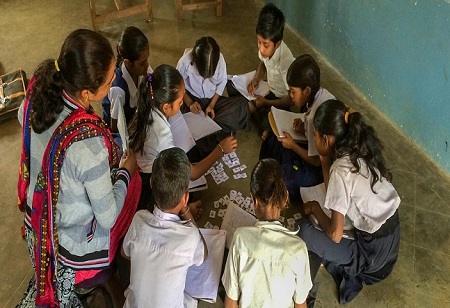-
The Singapore International Foundation (SIF) celebrated the successful conclusion of the Mathematics and Science Curriculum Enhancement Project in Bengaluru. The project, which was launched in partnership with Parikrma Humanity Foundation in 2017, aimed to raise the teaching standards of these subjects by equipping teachers with essential subject content knowledge and teaching skills, the project has benefitted over 58,700 educators and students in Karnataka. Parikrma Humanity Foundation runs a network of five Parikrma schools that caters to underprivileged children and has adopted six other government schools. Ms Shukla Bose, Founder CEO of Parikrma Humanity Foundation, shared that the teachers from Parikrma’s network of schools were very dedicated but often lacked the know how. That prompted her to look to the SIF, which Parikrma Humanity Foundation had partnered successfully for a nutrition project from 2014-2016. I wanted to make Parikrma not just the best charitable school in the country, but also like any other international school. To do that, our teachers needed international exposure and expertise. We were very fortunate to partner with the SIF to provide such opportunities for the teachers. The SIF gathered a team of Singapore International Volunteers (SIVs) comprising experienced educators to train teachers from Parikrma and government schools. Led by Ms Peggy Foo, a senior educator in the early childhood sector in Singapore, the SIVs were eager to share their insights and effect positive change through an area that they were familiar with, education and teacher training.
Over the past five years, the SIVs conducted a series of workshops where the Indian teachers learnt to design and conduct more engaging lessons. This would enable their students to understand new concepts better and develop a greater interest in the subjects. At the same time, the students would also pick up critical thinking and problem solving skills that are essential for the 21st century learner. The workshops were designed by the SIVs to replicate a student’s journey so that the Indian educators could experience it first hand. Ms Foo shared that her team used the same teaching techniques during the workshops that they hoped to see applied in the Indian classrooms. The Indian teachers could also reflect and discuss the changes that they wanted to make in their own classes immediately. After the workshops, the teachers gave very positive feedback that these approaches have helped them to internalise their learnings quickly. Ms Sindhu R, a teacher at Parikrma Centre for Learning JayanagarThe SIVs conducted the workshops very effectively, and it was easy to see how approaches like the 5E Model can help students learn better. After incorporating them in my lesson plans, I noticed that my students were more engaged in the lessons. When the SIVs visited some of the schools in Bangalore in June this year, they were heartened to see the Indian teachers applying the teaching techniques learnt from the project in their lessons. They used everyday objects as teaching aids, focused on process skills over memorisation, and encouraged activity based learning in groups. These practices also fostered critical thinking, problem solving skills and collective decision making among students.
Ms Bose shared that the teachers have been very encouraged by the positive change seen in their students resulting from the newly applied teaching techniques. We are seeing many more students raising their hands in our classrooms today than they did a few years ago. I believe this is a sign of a lot more participation and engagement in our classrooms and that effective learning is taking place. In addition to the training and upskilling of teachers, the project took on a training of trainers approach. A core group of 46 Indian educators were equipped with additional knowledge and facilitation skills. This enabled them to train peers in their own communities, ensuring a compounding and sustainable positive impact beyond the project’s duration. The next steps would involve exploratory discussions with Parikrma Humanity Foundation and Karnataka’s Department of State Educational Research and Training to identify potential areas for expansion. This could include cascading the training to more government school teachers. The lessons learnt from this project could also inform similar partnerships in other parts of India. The Mathematics and Science Curriculum Enhancement Project, marks a significant milestone in the SIF’s 28 years of bringing the peoples of Singapore and India together across the states of Maharashtra, New Delhi, Karnataka and Tamil Nadu to collaborate for good. It underscores the power of shared knowledge and expertise in transforming teaching practices and enhancing students learning experiences. Moving forward, such initiatives will be crucial in preparing students for the challenges and opportunities of the 21st century.
🍪 Do you like Cookies?
We use cookies to ensure you get the best experience on our website. Read more...

